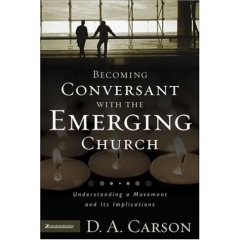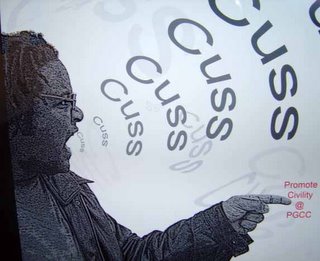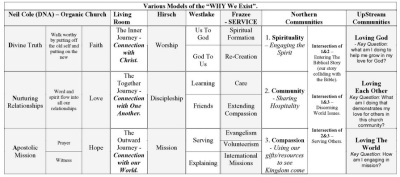When Don sat down it was morning tea and then my turn…
What follows is a rough outline of my notes. (I’m not normally too rigid with notes, but with only 15 minutes to respond I wanted to make sure I used them well.)
It seemed appropriate to begin with some humour. Laughter is a great way to ease a crowd, especially a mob of ‘theologians’. So I compared the following two blog posts as an intro. it took 3 minutes of my allocated 15 to do this, but I think it was time well spent.
I’m not sure if I fit”
Purgatorio – you might be emerging if”
Backyardmissionary – you TOO might be emerging if”
Am I part of the emerging church?
If I define myself by the caricatures on Purgatorio then probably not…
I’m a tad old and boring and bland to be a funky hip post-modern church leader.
And yet I am here today because I do find myself for better of worse aligned with the tag of ’emerging church’. I don’t fit the descrip very well!
(Ned Flanders as the ‘evangelical’ rep!)
The thing is I don’t think I fit the description in Don’s book very well either. I don’t know many in the Aussie emerging missional church who do.
In fact if I did I would be concerned.
(If I did then I think some of you would have had some fierce arguments with me by now!)
1. My own struggle with the term
Those who know me would know that I haven’t always sat comfortably with the term ’emerging church’, because it has such different meanings around the world and I don’t want to sign on to some of those definitions.
If it’s the next clever trick out of America to make your church grow then I sign off now.
In Oz we choose to use the term ’emerging missional church’ to emphasise the focus of our attention – the recovery of a missionary identity in the west.
I often use the tag ‘experimental church’ because we see ourselves as pioneering, innovating and experimenting. Some of what we do will succeed, some will fail and we need to be ok with that. At Forge we often refer to ourselves as the R & D arm of the church.
When I am asked what I am doing in Brighton – my own context – my response is usually to say I am leading a missionary team, who are seeking to plant new church communities in the local area and my dream is that we will have many small churches scattered all round the community populated by people who would otherwise not participate in church life.
Our (upstream) closest parallel may be the crowded house movement in Sheffield UK. (Note: ironically Steve Timmis – leader of Crowded House is a close friend of Don’s…)
2. Deviation from Orthodoxy?
If this really were the ’emerging missional church’ then I would be concerned too and I would not want my name associated with it. However if there are even 5% of churches in Oz that fit this mould then I would be surprised (and I am very familiar with the scene.)
The discussion in Australia has rarely turned to re-theologising, (at a foundational level) but has revolved around shaping a missional ecclesiology, rediscovering what it means to be the church in what is now undeniably a missionary context.
When Don’s book was published the Forge crew in Australia produced a response: Let me just read to you two paragraphs from that document:
(Caveat: Forge does not speak for all of EC in Oz any more than ‘Emergent’ speaks for the EC in other parts of the world… yes it is tricky!)
With regard to theological basis –
“We believe that the missiological agenda is best supported by a clearly framed theological approach that prioritises evangelism as part of an active, holistic, mission engagement in our world. As such we fully affirm the Lausanne Covenant as the theological basis for Forge and lovingly affirm the church as the primary agency for God’s mission.”
With regard to focus:
Forge remains theologically funded by an orthodox theology whilst being committed to a radical missiology based on innovating church and mission in the post-Christendom West. The predominant issues for us remain the pursuit and recovery of a full-orbed biblical Christology which in turn will fund our missiology which then informs all subsequent ecclesiology.
We are simply seeking to recover the same classic missionary principles that have guided our overseas missionaries for years now and apply them to the western context.
So we would affirm Don’s concern that we continue to build a movement on the foundations of orthodoxy and faithfulness to the scriptures.
One of the authors quoted in Don’s book is Spencer Burke, also the author of ‘A Heretic’s Guide to Eternity’. Recently Spencer sent me a copy of his book to review on my blog as a way of gaining exposure and interaction.
Spencer calls himself a universalist who believes in Hell – which to me seems an oxymoron – (not unlike a Baptist who believes in change – or a Sydney Anglican with a sense of humour) – and advocates a movement from religion to spirituality with what he calls ‘mystical responsibility’ as the final destination. He questions how we can know anything for sure (an issue Don covers in his book very well – where he writes about knowing truly without knowing omnisciently) and in discussing the issue of salvation pays minimal attention to the place of the cross.
My reviews are online on my blog. You will find that I do not agree with Spencer on many issues and I am more than happy to say so. That said I was impressed with Spencer’s willingness to engage with Scot Mcknight re the content of his book. (Don did mention why he doesn‘t comment on blogs – but more on that later)
FWIW I am not worried that most here will believe me a heretic because of Don’s book – those who know me certainly won’t – but I am concerned that those who are new to the area will accept the word of a respected theologian over and above a local missionary they do not know personally. And I am concerned for the shadow his book may cast over those seeking to experiment and explore new ways of being church and doing mission.
Given our unwavering commitment to orthodox theology I am disappointed that many of us are portrayed as questionable in this area.
3. Which makes me wonder if the book ought to be retitled
It would seem that the conclusions Don arrives at are based on the writings of Brian McClaren primarily, as well as Spencer Burke, Steve Chalke, Robert Webber, Dan Kimball and Len Sweet. There may be one or two others.
My understanding – (please correct me if wrong) – is that there was no actual face to face interaction with emerging church leaders or interaction with specific ’emerging churches’.
The sample group for research were the writings of a limited number of texts which may or may not have been read accurately. (At this point I was ‘gonged’ giving me 3 minutes to wind up my talk. I wanted to address some issues related to B Mc but just didn’t have the time…)
As well as being limited to the writings of Americans (Chalke excepted) it does not explore the variety of nuances of the Emerging church around the world. It seems to define what is happening around the world by what is happening in America. This is problematic.
Would American evangelicals feel comfortable if a book was written critiquing evangelicalism based on the views of Phillip Jensen?
So I am raising a serious question as to the research methodology. Is it fair to review the writings of a few and then apply them worldwide?
Is that good practice?
Given that Don’s critiques do not resonate at all well with us, I would think not.
I wonder if a more accurate title might be ‘Becoming Conversant with Brian MaClaren, Steve Chalke and others’
4. Regarding the question of whether we accomodate post-modernism or confront it.
Not everyone is down on propositional truth. In fact I don’t think I know too many EC Aussies who would dismiss propositional truth at all. A more humble approach to scripture is not a denial of its truth, simply a recognition that we do not know completely.
Our primary concern – as with all missionaries – has been how to live in the culture and yet not embrace its negative aspects.
Our own church name ‘Upstream Communities‘ was arrived at after believing that our core task was to make disciples and to call people to swim against the flow while living in society.
(I skipped over this bit up to the ‘conclusion’ as I was short of time)
As we engage with people we do risk syncretism – but we are already syncretistic and I believe we kid ourselves if we think we are untainted by our context. We just don’t see it as well.
I like Paul’s words in the message:
1Co 9:19 Even though I am free of the demands and expectations of everyone, I have voluntarily become a servant to any and all in order to reach a wide range of people:
1Co 9:20 religious, nonreligious,
1Co 9:21 meticulous moralists, loose-living immoralists,
1Co 9:22 the defeated, the demoralized–whoever. I didn’t take on their way of life. I kept my bearings in Christ–but I entered their world and tried to experience things from their point of view. I’ve become just about every sort of servant there is in my attempts to lead those I meet into a God-saved life.
1Co 9:23 I did all this because of the Message. I didn’t just want to talk about it; I wanted to be in on it!
Ironically we don’t speak a lot of the whole post-modern deal over here. It was talked about 5-10 years ago, but it doesn’t seem to be the primary issue. We just accept that this is the world we live in and get on with it.
Conclusion
In conclusion I would like to think we are as concerned for biblical fidelity as I am sure Don Carson is concerned for seeing the gospel transform our world.
We may come at these questions from different angles and that may shape our understandings and perceptions.
We need each other and we need to listen to each other. We need quality biblical scholars to help us read the Bible more effectively and we need earthy on the ground missionaries who can keep the scholars honest.
———–
I was disappointed that the time went so fast!
I had so much I would have loved to say, but finished up really just defending the turf of ECers here in Oz. A large part of my concern with what Carson had to say was related to the fact that I don’t know any theologically aberrant ECers, but the book seemed to suggest they were the norm.
In part III I’ll try and remember what my good mate Geoff Westlake had to say because he was sensational and spoke with great clarity and conviction.






















